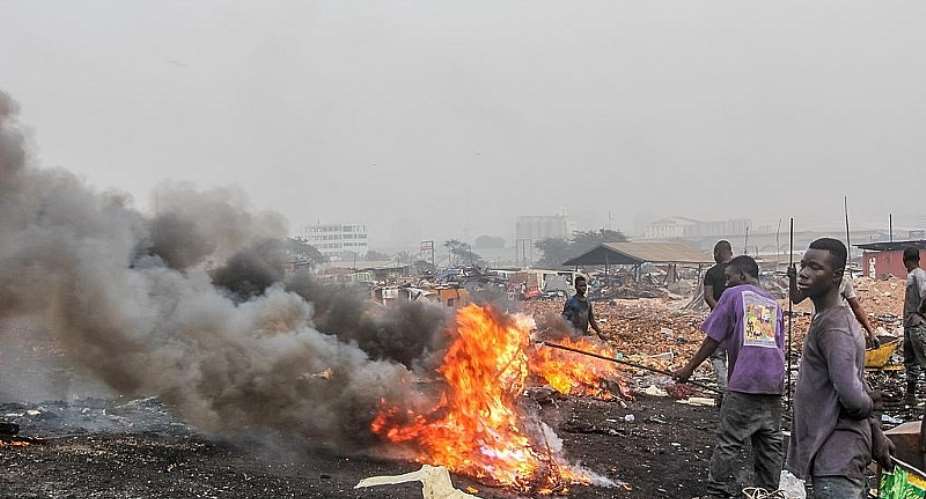Reusing, repairing and recycling products is part of the circular economy (CE), but more needs to be done to include regions such as Africa, where people are already working independently on their own programmes, according to a new report by Chatham House.
“The problem here is that there has been very little focus globally on the nature of the circular economy in developing countries and the implications of a transition to a circular economy,” Laura Wellesley, research fellow at Chatham House and an author of the report told RFI.
While the European Union, Japan and China are seen as major implementers of CE, using recycling programs to maintain a cleaner environment and create jobs, there is already a wealth of activity going on in Africa on the policy and business side, said Wellesley.
The ban on plastic bags in Kenya and Rwanda is a good example of CE, but the problems that have arisen from this shows that there needs to be another way of helping communities and businesses so that they can adjust.
“There's been a lot of leakage into the system with plastic bags being smuggled into the country and also difficulties for businesses in adhering to that ban because there isn't sufficient alternatives,” said Wellesley. “There's not an accessible, cheap and good quality alternative.”
The ban has hit fruit and flowers exporters particularly in Kenya. Wellesley said that developed countries “need to see more of a global, inclusive conversation around the context.”
Don't forget informal sector workers
The report also looks at labour in the informal sector, which makes up a large portion of workers, particularly in sorting and recycling waste, from household rubbish to electronic products. The work of these people falls under the category of circular activity already, but their jobs can be dangerous and poorly regulated.
The report gives the example of Agbogbloshie, Ghana, where electronic, or e-waste, is burned to take out the copper from old computers and appliances. Scientists have found two toxic chemicals in chicken eggs in Agbogbloshie that come from treating e-waste.
Informal workers such as these need to be recognised and integrated into policies, says Wellesley, “to ensure that governments and businesses introducing CE don't inadvertently shut out informal workers by taking those opportunities away.”
Good governance is the basis for how the African continent can continue to contribute to the Circular Economy, but much is needed from global trade, according to the report.
The African region has been used by manufacturers in developed countries to dump substandard products, including foodstuffs, without adequate safety and health measures that are used in other parts of the world. Wellesley says that trade rules need to be standardised in order to prevent this from continuing. This can also be applied to countries getting rid of their waste.
“What we don't want is whereby developed countries export recycling and waste to fulfill their own domestic commitments to the CE without taking responsibility for the quality of those goods and how they're processed at destination,” said Wellesley.
Some developed countries have been exporting waste, even illegally, to deal with their own CE practices.
“There's a need to think about the role of trade in supporting the circular economy and equally to put in place the necessary standards and rules to ensure that trade doesn't have a negative impact on communities in developing countries,” Wellesley added.





 Excessive partisanship breeds madness — Prof Gyampo on NPP’s defence of cedi dep...
Excessive partisanship breeds madness — Prof Gyampo on NPP’s defence of cedi dep...
 PDS scandal: ‘The totality of Ghana’s loss is the ‘dumor’ being experienced toda...
PDS scandal: ‘The totality of Ghana’s loss is the ‘dumor’ being experienced toda...
 677,140 births and 50,992 deaths recorded in 2022 - Statistical Report
677,140 births and 50,992 deaths recorded in 2022 - Statistical Report
 Prince Harry, Meghan visit Nigeria
Prince Harry, Meghan visit Nigeria
 Ghana’s electoral commission is one that trusts thieves — Omane Boamah
Ghana’s electoral commission is one that trusts thieves — Omane Boamah
 Mahama is the embodiment of corruption; he can’t advise NPP gov’t on corruption ...
Mahama is the embodiment of corruption; he can’t advise NPP gov’t on corruption ...
 All government cares about is spending more and more money on itself — Dalex Fin...
All government cares about is spending more and more money on itself — Dalex Fin...
 COVID-19: GHS records 57% vaccination coverage
COVID-19: GHS records 57% vaccination coverage
 My government will support churches – Bawumia assures Clergy
My government will support churches – Bawumia assures Clergy
 Don't be 'conduit' to President Akufo-Addo's 'I can't hand over power to Mahama'...
Don't be 'conduit' to President Akufo-Addo's 'I can't hand over power to Mahama'...
